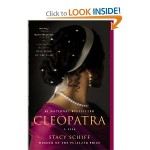Three more book reviews …

Hovering in the middle of the New York Times Bestsellers List is Cleopatra: A Life by Stacy Schiff. I was hesitant to read this book because Cleopatra isn’t exactly an unstudied personality. More has probably been written about her than any woman of the ancient world. But the reviews were so good that I gave it a try. I’m glad I did. Schiff has sorted through a lot of the misinformation about Cleopatra, whose history was mostly written by her detractors. One of the interesting threads of the book is how the cultural and gender differences of the Romans who wrote about the Queen of Egypt influenced their story telling. But Schiff isn’t trying to glorify Cleopatra; she’s quite clear that the Queen had her issues, and her faults could easily be at the root of her downfall. Toward the end of the book it becomes clear that Cleopatra fixated on wooing just one man (Marc Antony) and not the rest of the Roman leadership. It was a mistake and ultimately the root of her failure. Schiff doesn’t say so, but I kept wondering if Cleopatra’s cultural insights failed her … perhaps she kept thinking that the rest of the world operated as her monarchy did, and that the authority of just one Roman Emperor was enough to save her. But who knows; it all happened over 2000 years ago. And that’s the beauty of a book like this … the mystery of Cleopatra still lives.
Dave Gibbons is an acquaintance that I have long admired. His book The Monkey and the Fish is a call to view the Church as a “third culture church” and for pastors and lay leaders to practice “liquid leadership.” The information in the book is not particularly new: the demographics of the Church are changing rapidly and our culture is shifting just as rapidly. Such insights are well presented and I appreciated the reminder. But what I really enjoyed about the book is that Gibbons is a practitioner of the changes he calls for, and he has a track record of success. There are a lot of academic books that outline how the Church needs to change, but the authors are often theorists and not practitioners. And there are a few books written by people who have stumbled into the new realities of our world and found a way to work within that context, but they are not particularly insightful. Gibbons finds the right balance. Further, he does so without condemning any group or alienating any church history. If you are a leader in the Church, read this book.
Johanna Ruth Dobschiner is not a name you’ll see on the best seller lists. Her book Selected to Live was published in 1969 and describes her life in Holland during World War II. Most people have read or know the basic story of The Hiding Place by Corrie ten Boom. Well, Selected to Live is the story of one of those who was hiding. It is powerful and insightful. From her experience interacting with those who hide her, Dobschiner chooses to follow Christ. It’s an amazing story.
